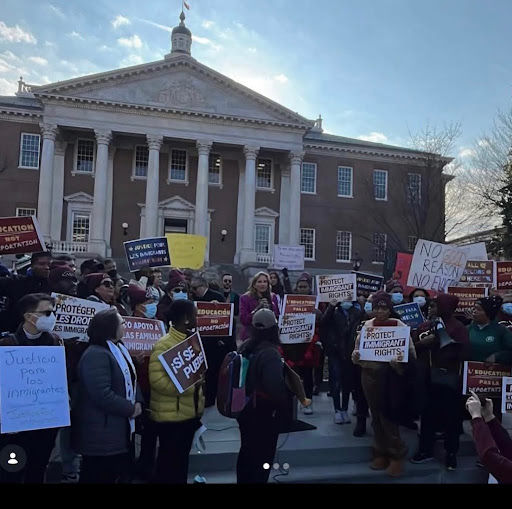One Week Until Session
- Jan 7, 2022
- 4 min read
Updated: Feb 3, 2022

Dear Friend:
We are one week away from the start of the 444th session of the Maryland General Assembly. Although we will gather again under the pandemic’s shadow, I am determined to make relentless forward progress on several legislative fronts.
My key priorities are reflected in the bills I have authored and co-sponsored for this session: confronting climate change, improving our food systems, and protecting workers’ rights and safety for all roadway users.
Grid Reliability and Inclusive Distribution (GRID) Act (HB88)
Expanding Clean Energy Microgrids for LMI Communities (HB 31)
Supporting Energy Efficiency for Low-Income Marylanders (HB108)
Farm to Food Security Act (Maryland Food for Maryland Families) (HB147/SB121)
Grants for School-Based Food Waste Diversion (HB151/SB124)
Maryland Worker Income Protection Act (HB 72/SB78)
Making Montgomery County Business Improvement Districts More Democratic
SAFE Roads Act of 2022 (SHA Pedestrian & Bike Safety Improvements)
I plan to introduce several other bills in the coming days. Look for news about them and more updates from Annapolis in future letters from me.
Onward,
Lorig Charkoudian
P.S. I will be canvassing in my District every weekend, including on January 8th. Want to join me and learn first-hand what’s on people’s minds? It’s easy and illuminating.
Grid Reliability and Inclusive Distribution (GRID) Act (HB 88)
Modernizing Maryland’s energy grid is a high priority and a key tool in fighting climate change. This bill requires the planning and regulations for the distribution grid to support Maryland’s goals of decarbonization, greenhouse gas reductions, renewable energy, equity, family-sustaining employment, energy resiliency and reliability, and cost-effectiveness in an inclusive and transparent manner. Click here for a fact sheet on this bill. Click here for the current status of this bill. Expanding Clean Energy Microgrids for LMI Communities (HB 31)
Microgrids or “resiliency hubs” are localized grids that can disconnect from the traditional grid and operate independently during extended grid outages, such as those due to extreme weather events. This bill will help expand microgrid development in low- and moderate-income neighborhoods; develop opportunities for community ownership of solar; and coordinate emergency preparedness efforts and funding in a way that maximizes federal funds for these efforts. Click here for a fact sheet on this bill. Click here for the current status of this bill.
Supporting Energy Efficiency for Low-Income Marylanders (HB 108)
Too many low-Income Marylanders face high energy bills and unhealthy living conditions because of broken HVAC systems, drafty windows, and unreliable electrical systems. This bill helps low-income residents save energy and lower their energy costs. It coordinates and consolidates a range of federal and state funding sources, enables state-funded home energy audits in qualified low-income homes, and increases Empower and state funding for programs targeting low-income households to make energy efficiency improvements such as new insulation, better windows, EnergyStar® appliances, LED light bulbs and more. Click here for a fact sheet on this bill. Click here for the current status of this bill.
Farm to Food Security Act: Maryland Food for Maryland Families (HB 147/SB 121)
A shift to a more sustainable, localized food system can help strengthen supply chains, build up local farms, and bring equity to consumption and access. This bill invests in three programs to enhance resiliency and reduce food insecurity:
increasing Maryland Market Money, which doubles the value of federal nutrition benefits spent at farmers markets
piloting a Farm to School grant program to increase school purchases of locally grown and produced food, and
creating the Maryland Food and Agricultural Resilience Mechanism (MD FARM) to support Maryland-based procurement, harvesting, contracting, distribution, or processing for hunger relief efforts.
Grants for School-Based Food Waste Diversion (HB 150/SB 124)
This bill creates a competitive grant program to support school-based initiatives to prevent, reduce, and compost pre- and post-consumer food waste. Initiatives can include training and education, school infrastructure improvements, new programs to serve food that has already been prepared, contracts with commercial composters, and other innovative techniques for managing school-based food waste. Click here for a fact sheet on this bill. Click here for the current status of this bill.
Making Montgomery County Business Improvement Districts More Democratic (MC 8-22)
A Business Improvement District (BID) is a self-taxing district designed to enhance the economic vitality of a specific commercial area. All additional taxes collected within the BID are given to a nonprofit organization managing the BID. Currently, only property owners can elect members of the Board. This bill improves BID governance by requiring a wider range of stakeholders--including commercial tenants--to participate in decision-making, establishing more representative board election processes, and allowing broader participation in the decision to establish a BID. Click here for a fact sheet on this bill. Click here for the current status of this bill.
SAFE Roads Act of 2022 (SHA Pedestrian & Bike Safety Improvements)
This bill aims to reduce or prevent roadway deaths and serious injuries. It requires the State Highway Administration to review high pedestrian and bike injury corridors/intersections and implement timely engineering improvements with increased spending and to design future projects for even greater safety. Click here for a fact sheet on this bill. Stay tuned for a link to this bill.
Onward,
Lorig Charkoudian




Comments